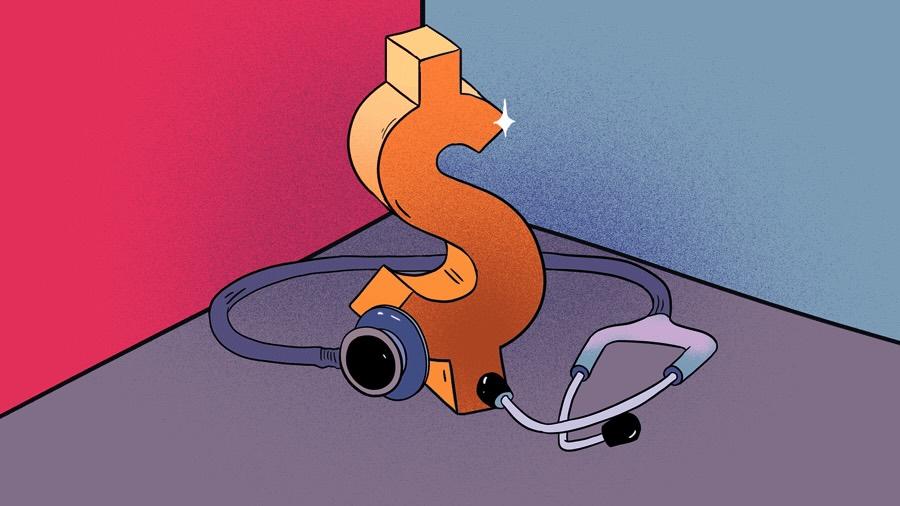Americans are spending ever-rising sums of their own money on healthcare.
So-called out-of-pocket expenses now top $470 billion annually, per the federal government’s latest accounting. Spending is expected to keep rising too, along with the spread of high-deductible health plans and care providers who don’t accept insurance.
While consumers aren’t exactly thrilled about this trend, startup founders and their backers see some very scalable opportunities. In the past couple of years, hundreds of millions of dollars have gone to companies working on things like health savings account platforms, care price comparison apps, and tools for employers offering high deductible plans.
Who’s getting funded? Using Crunchbase data, we curated a sample list of 19 companies innovating around the rise of out-of-pocket health spending. Collectively, they’ve raised more than a half-billion dollars to date.
Looking at the list above, we see that much of the funding activity skews early-stage. There’s likely potential for exponential growth ahead, however, given the vast sums at play coupled with the seemingly low bar for improving on the status quo.
As sector heavyweight Andreessen Horowitz put it in an explainer piece on its investment thesis: “Why are we so bullish on consumer health? The current state of affairs is dismal. Patients are unhappy; providers are burned out.”
The firm’s investment strategy rests on the notion that as consumers are footing more healthcare costs, they’re becoming more discerning about healthcare experiences and thus “likely to vote with their wallets.”
Key themes: Access, price transparency, alternative plans
It’s also worth noting that more consumers have wallets with which to vote. As of 2022, more than half of private-sector workers (53.6%) were enrolled in high deductible health plans, according to a recent study. Enrollees also commonly use health savings accounts or flexible spending accounts to cover day-to-day medical expenses.
Per Colin Tobias, a partner at SemperVirens Venture Capital, a lot of recent startup investment centers around making it easier to use HSAs and manage self-pay transactions. One he points to in this arena is San Francisco-based PayZen, which offers consumers payment plans for health expenses. Another is First Dollar, which develops tools to consolidate benefits in one digital wallet.
Others are working on tools to help healthcare consumers find the best value for their money. Among the more heavily funded startups taking this approach is Turquoise Health, which lets consumers compare prices for medical procedures from providers in their area. The San Diego company secured $30 million in Series B financing in January, bringing total funding to date to over $55 million.
Probably the most recent funding recipient on the price transparency front, meanwhile, is Milu Health. The Illinois startup picked up a $4.8 million seed round last month to build out technology that analyzes health records seeking ways to save on and improve care.
Employers and ICHRAs
The healthcare industry is famous for minting acronyms, which brings us to our next popular investment theme: ICHRAs, or Individual Coverage Health Reimbursement Arrangements.
This is acronym-ese for employers who, rather than offer their own health insurance plan, provide money to employees who can use it to pay for their own policies or cover out-of-pocket medical expenses. ICHRAs are increasingly popular with employers, and startups are looking to tap into some of that growth.
Several of these startups have raised funding pretty recently. Berkeley, California-based Venteur, which offers AI-enabled tools for finding the best use of ICHRA money, picked up $7.6 million in an August seed financing. Thatch, which offers tools for selecting suitable coverage and debit cards for health expenses, landed $6 million last year. StretchDollar, which markets to small businesses extending ICHRAs to employees, closed on a $1.6 million pre-seed round in September.
Getting to better
Overall, as much as most of us hate paying out of pocket for health expenses, especially when we already pay hefty sums for insurance, there are some encouraging takeaways from recent trendlines.
One is that employers are getting more tools to make contributions and help employees navigate coverage in a world of high deductibles and higher out-of-pocket spending. In addition to contributing to policy costs, employers can also fund FSAs to cover self-pay expenses.
Another is that, if AI-enabled tools perform well and providers make price transparency a priority, startups could help mitigate one of the biggest complaints about self-pay care, which is anxiety around price. Before opening our wallets, consumers would greatly appreciate the ability to know from the start what a consultation, test or procedure is going to cost.
Related Crunchbase Pro list:
Illustration: Dom Guzman

 10 months ago
64
10 months ago
64